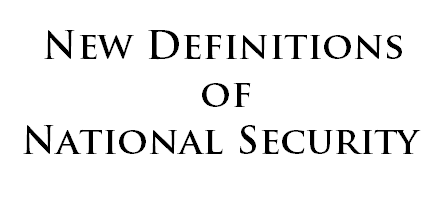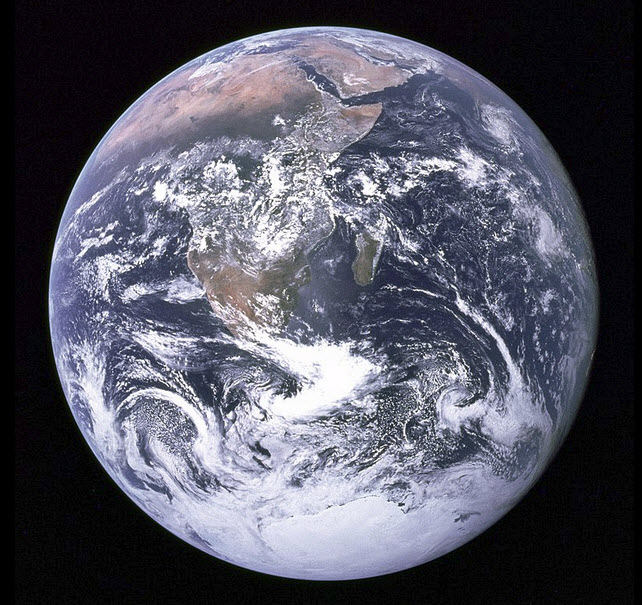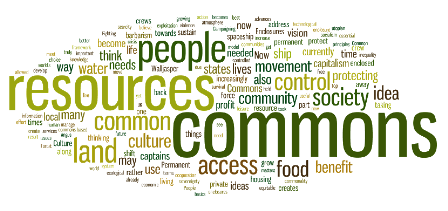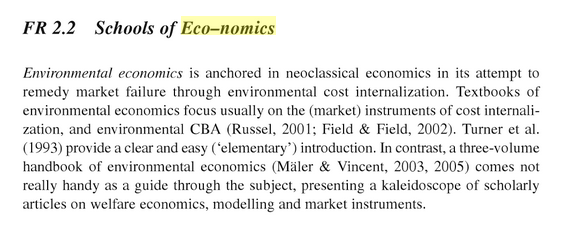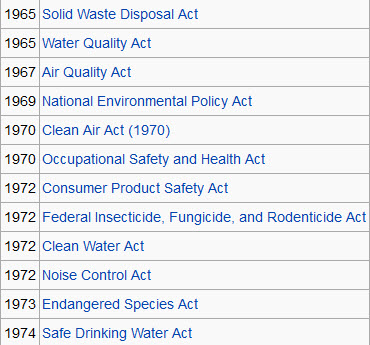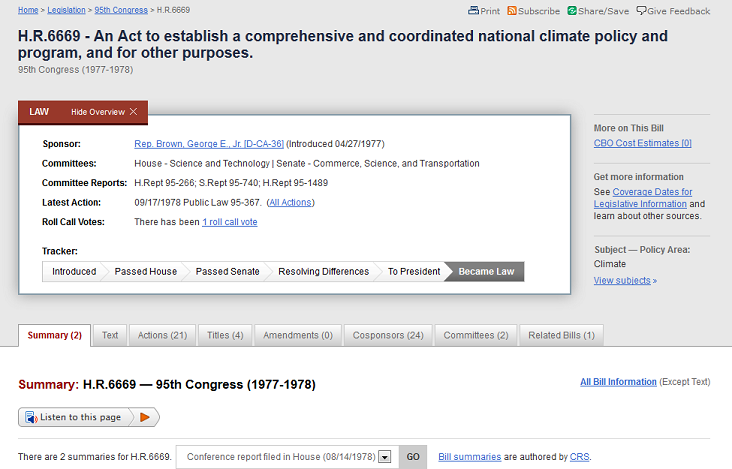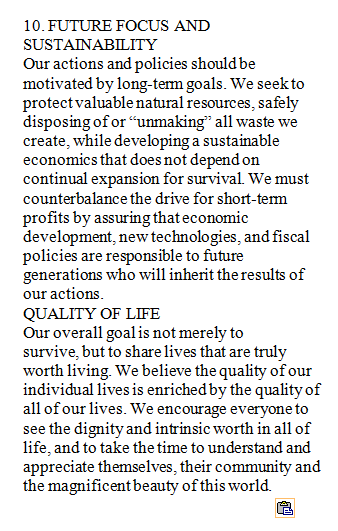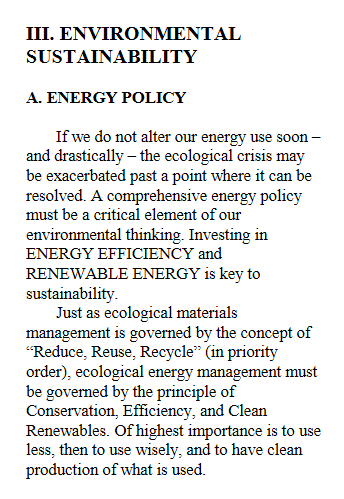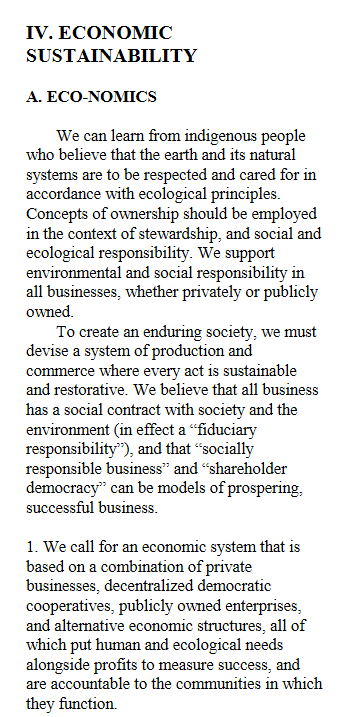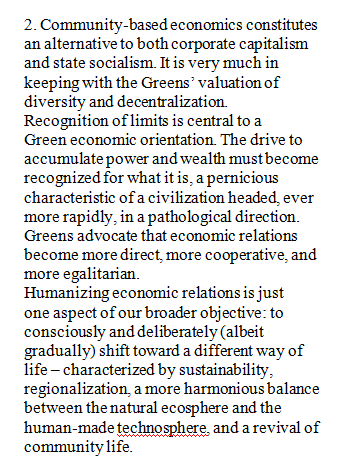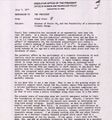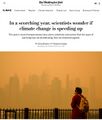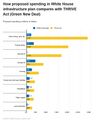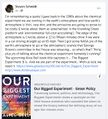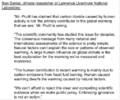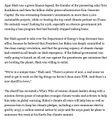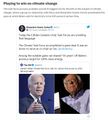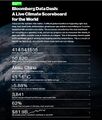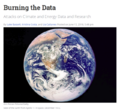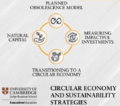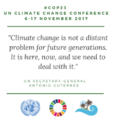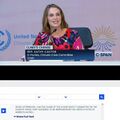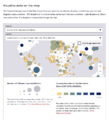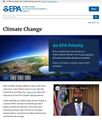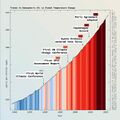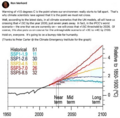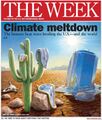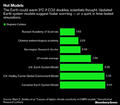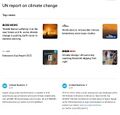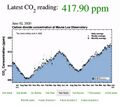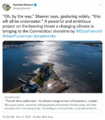Category:Eco-nomics
<addthis />
SJS / Siterunner: In the mid-1970s, continuing what became a thirty plus year professional relationship with Congressman George E. Brown, I began to advocate developing a paradigm (ala Thomas Kuhn's definition of the scientific term) that extended environmental security concepts coming out of the student and environmental movement of the 1960s.
In the 1970s, I was a young editor at a NY publishing and printing company (Faculty Press) and at nights I was immersed in a History of Ideas / Political Economy program at the Graduate Faculty of the New School, the New School for Social Research. Hannah Arendt was there when I arrived in the city and her reputation and the university's reputation as a "University in Exile" originally having attracted some of the top European liberal scholars in the world spoke to me of deep thinking.
Professors like Robert Heilbroner and David Gordon opened new vistas of thought.
In 1976 I worked with Jerry Brown's presidential campaign and during this period the Governor became nationally known for his forward thinking (some, like Mike Royko in Chicago thought the Governor was a little too forward and ribbed him until years later Mike and most others saw the success of Governor's Brown's 'out in front' ideas.)
I took years reading the classics in economics, political science, philosophy.
●
Over the 70s and 80s Congressman Brown and I spoke often. We met in Washington DC regularly and, as a trained scientist/engineer, he continued as a strong voice in the science community to be focused intently on an array of environmental issues. The question of 'real security' not illusory security was at the core of our thinking and 'deep' environmental challenges were at the center of a new foundation of environmental legislation. The Congressman and our allies were successfully shaping the first generation of environment laws and we were envisioning and achieving multiple goals in these endeavors.
Academically, a "deep ecology" was forming as a "school of thought" but this was more of a thread (in my opinion) than a deep current capturing the a more diverse, multi-dimension body of knowledge, belief and vision.
In the early 1990s I worked as a senior adviser with Jerry Brown in his presidential campaign, drafting an insurgent platform and bringing it forward and advocating a change in direction for the Democratic party, a "peace dividend", a focus on worker/environmental standards, a move away from dominance of 'money-in-politics' to a new type of populist politics. It wasn't to be although our campaign surprised and succeeded in its own way -- and so I moved on...
My drafting of the founding national Green Platform began after the 1992 Brown campaign platform and your siterunner chose to 'go independent' and build a serious, credible Green Party, first in New Mexico and then a formal, legal Green national party.
●
The concept of 'eco-nomics' advanced in my work.
My writing and political ventures explored eco-strategic ideas, a new concept of political economy and sustainability as I discussed it with George, and Jerry, and associates in many arenas. At the time, as a member of the Writers Guild and immersed in movie-making, bringing serious themes to the big screen, I wanted to go beyond Hollywood and a writer with whom I was working, Stirling Silliphant, urged me to leave the city if I wanted to do "serious writing." So, after much thought, in the late 1980s I moved from the beach in Santa Monica and Pacific Palisades to the high desert, to Santa Fe, a town named after St. Francis of Assisi. I lived on Camino del Monte Sol, under Sun Mountain, across from a Monastery and the campus of St. John's College. I became an adviser to the President of St. John's College as we attempted to fund and build a new library and sought, at first successfully the archives of Robert Hutchins and the Center for the Study of Democratic Institutions as a core collection, then had to go back on our agreement when we were outvoted by the college's Annapolis directors.
My writing began every morning as monks chanted in the near distance and, in some ways, my original work reflected Bear & Company thoughts of that time as with Charlene Spretnak's "Spiritual Dimensions of Green Politics" and Matthew Fox were brought together with science that was revealing gathering threats to "the Commons".
The result was a more developed body of thought and work, "New Definitions of Security", and over the years these new definitions have expanded into security studies (as with Strategic Demands) and security briefs (as with Strategic Demands of the 21st Century: A New Vision for a New World, from conferences (Surviving Victory) to political platforms as foundations for presidential campaigning, Jerry Brown's in 1992, and on to [the founding a new political party, the Greens in 2000.
The time for "Eco-nomics" is here and now. Let us explore new visions of security running deep with diversity.
"Eco-nomics" for the 21st Century
- A Necessary Challenge to Neoliberal Economics
- Turning from Short-Term to Long-Term Thinking
- 'Eco-nomics: A New Green Political Economy'
- The Commons
- http://www.greenpolicy360.net/w/The_Commons
- Peer Production - http://p2pfoundation.net/
- http://www.greenpolicy360.net/w/The_Commons
○ ○ ○ ○ ○ ○ ○ ○ ○ ○ ○ ○ ○ ○ ○ ○ ○ ○ ○ ○ ○ ○ ○ ○ ○ ○ ○ ○ ○ ○ ○ ○ ○ ○
Can capitalism, conservation, and cosmopolitanism coexist?
Via Grist / Nathanael Johnson / December 2016
- https://grist.org/series/the-poverty-solution-put-people-first/
- https://grist.org/article/how-do-we-fight-poverty-without-wrecking-the-planet/
- https://grist.org/food/costa-rica-modernized-without-wrecking-the-environment-heres-how/
- https://grist.org/food/what-the-humble-turnip-can-teach-us-about-economic-growth/
- https://grist.org/food/how-food-forests-and-people-are-connected-in-10-charts/
- https://grist.org/business-technology/the-case-for-putting-people-before-nature/
- https://grist.org/business-technology/how-a-growing-timber-business-revived-a-forest/
- https://grist.org/food/what-do-small-scale-farmers-want-for-the-future-and-for-their-kids/
Unbridled capitalism cannot accurately value nature, and does not recognize the property rights of the people who depend upon the natural world for survival. All of humanity depends upon natural systems, of course — but it’s the poor living off the land who have the most to lose from their destruction.
When capitalism is bridled and harnessed, so as to recognize the rights of the disenfranchised, it can provide prosperity and protect the environment.
As economist Amartya Sen has argued, the goal of economic growth is not simply growth, but the provision of liberty. When people have freedom — freedom from hunger, disease, and oppression, the liberties necessary to take the long view — they can protect the resources they depend upon, not to mention the creatures and landscapes they love.
If people in poorer countries need to take a more expensive, but less carbon intensive, path out of poverty, rich countries should be prepared to pay the difference. At the Paris climate summit and preceding meetings, leaders have set up a (totally Byzantine) system for making these sorts of payments. So far, affluent countries have promised more than they have contributed.
The faster poverty declines, the faster the natural systems that support human lives will rebound — and, most importantly, the freer those lives will be.
○ ○ ○ ○ ○ ○ ○ ○ ○ ○ ○ ○ ○ ○ ○ ○ ○ ○ ○ ○ ○ ○ ○ ○
A Visible and Invisible Hand of Eco-nomics
http://marginalrevolution.com/marginalrevolution/2014/05/the-invisible-hand-of-eco-nomics.html
○ ○ ○ ○ ○ ○ ○ ○ ○
Eco-nomics: Are the Planet-Unfriendly Features of Capitalism Barriers to Sustainability? Abstract:
This paper argues that there are essential features of capitalist modes of production, consumption, and waste dispersal in interaction with the environment and its built-in systemic features that contradict long-term sustainable development.
○ ○ ○ ○ ○ ○ ○ ○ ○
The Rise Of ECO-nomics: From Ego to ECO
- How to improve future competitiveness and the environment by changing the corporate consciousness
http://studenttheses.cbs.dk/bitstream/handle/10417/2751/troels_m_kranker.pdf?sequence=1
○ ○ ○ ○ ○ ○ ○ ○ ○
ECO:nomics: Capitalism and the Environment - A Wall Street Journal perspective - http://economics.wsj.com/
- "Fiduciary responsibility speaks of quarterly returns; survivability speaks to long-range vision and strategies"
March 2015 -- Wall Street Journal forum to explore "opportunities — and pressing risks — emerging around the world in businesses impacted by the environment."
"Through on-stage interviews with leading figures and interactive sessions with peers in diverse industries, participants at ECO:nomics 2015 debated, discussed and got the inside story on essential issues: investing in innovation, disrupting current business models, the new meaning of sustainability and the future of the environmental movement, where energy policy is heading, and much, much more."
Click here to view the 2015 WSJ ECO:nomics report.
Videos from ECO:nomics forum:
Does Clean Power Plan Threaten Grid?
Computers Will Optimize the Power Grid
EPA Admin. Says Carbon Regulation is Constitutional
○ ○ ○ ○ ○ ○ ○ ○ ○
Overview: History of Ideas, "Schools of Eco-nomics"
http://www.springer.com/us/book/9781402069659
http://down.cenet.org.cn/upfile/8/2008103018298186.pdf
________________________________________________
'Ecological Economics': An emerging paradigm
Sustainable economies, a new interdisciplinary framework that embraces the linkages among economic growth, environmental degradation, and social inequity.
https://en.wikipedia.org/wiki/Herman_Daly
http://islandpress.org/herman-e-daly
"Blue-Green Eco-nomics: From the 1960s Forward
Global Security: Critical Security
○ ○ ○ ○ ○ ○ ○ ○ ○
Further Reading
Center for Economic and Policy Research, Washington DC
- https://en.wikipedia.org/wiki/Center_for_Economic_and_Policy_Research
- http://cepr.net/about-us/board
Center for Popular Economics, Amherst, MA
Dollars & Sense, Somerville, MA
Global Development and Environment Institute, Tufts University
- https://en.wikipedia.org/wiki/Global_Development_and_Environment_Institute
- http://ase.tufts.edu/gdae/
Political Economy Research Institute, UMass, Amherst
Progressive Economics Think Tanks
○
SJS / Siterunner: Again, looking back to the Graduate Faculty of the New School in New York, it would be appropriate to look at the political economic writing of one of my professors, David M Gordon, who passed away at a young age in 1996. As David spoke of long-term economics and coined the phrase “social structure of accumulation” (SSA) that augers the need to consider multi-generation impacts of economic activity. Let's look back and forward with David's co-author Thomas Weisskopf who writes of David at the 2014 David Gordon Memorial Lecture --- Reflections on 50 Years of Radical Political Economy
New School for Social Research / Political Economy-Liberal Studies-History of Ideas (1970-2000)
- Gordon, David M. with Bowles, Samuel, "Beyond the Waste Land: A Democratic Alternative to Economic Decline" (1983) - https://www.amazon.com/Beyond-Waste-Land-Democratic-Alternative/dp/0385183453/
- Gordon, David M. with Bowles, Samuel; Weisskopf, Thomas E. "After the Waste Land: Democratic Economics for the Year 2000 (1990) - https://www.amazon.com/After-Waste-Land-Democratic-Economics/dp/087332644X/
Publications of David Gordon Memorial Lecture Series - http://urpe.org/?page=rrpe&side=browse_content&sub=david_gordon_memorial_lecture
○
Center for American Progress
Economic Policy Institute
Institute for New Economic Thinking
Institute for Policy Studies
- https://en.wikipedia.org/wiki/Institute_for_Policy_Studies
- https://en.wikipedia.org/wiki/Institute_for_Policy_Studies
New America Foundation
○
Small Is Beautiful by E.F. Schmumacher (as interpreted by California Governor Jerry Brown)
SJS / Siterunner: One of my first conversations with Jerry Brown, which began a decades long association, had to do with Schumacher and a philosophy, a paradigm, that was gaining support in our nascent environmental movement...)
http://www.latimes.com/politics/la-pol-sac-climate-brown-profile-20151201-story.html / December 2015
Throughout his political career, Brown has displayed a desire to minimize society’s footprint on the Earth -- a stance that will gain a global platform when he arrives in Paris on Friday to participate in the U.N. summit on climate change.
In his spartan lifestyle as a young Jesuit seminarian, his famously barren apartment when he was governor the first time in the 1970s and his more recent campaign to slash greenhouse gas emissions, Brown has always explored ways to limit consumption.
Four decades ago, his focus on the environment -- talking of "Spaceship Earth" and exhortations that "small is beautiful" -- was a curiosity. But as 50,000 people gather in Paris in an ongoing effort to stop global warming, it’s clear that the world has caught up with Brown.
During his weeklong trip, the governor will tout California’s policies, rub shoulders with corporate executives, sign agreements with foreign leaders and be feted at the U.S. ambassador’s residence for his efforts to urge a stronger international accord at the summit.
“They’re not calling him Moonbeam anymore,” said Tom Hayden, an environmental activist and former state legislator who has worked with Brown for years. “This is his moment.”
○
Small Is Beautiful: A Study of Economics As If People Mattered
- By E.F. Schumacher, Book published in 1973
Wikipedia: Schumacher argues that the modern economy is unsustainable. Natural resources (like fossil fuels), are treated as expendable income, when in fact they should be treated as capital, since they are not renewable, and thus subject to eventual depletion. He further argues that nature's resistance to pollution is limited as well. He concludes that government effort must be concentrated on sustainable development, because relatively minor improvements, for example, technology transfer to Third World countries, will not solve the underlying problem of an unsustainable economy.
Schumacher's philosophy is one of "enoughness", appreciating both human needs and limitations, and appropriate use of technology. It grew out of his study of village-based economics, which he later termed Buddhist economics, which is the subject of the book's fourth chapter.
He faults conventional economic thinking for failing to consider the most appropriate scale for an activity, blasts notions that "growth is good", and that "bigger is better", and questions the appropriateness of using mass production in developing countries, promoting instead "production by the masses". Schumacher was one of the first economists to question the appropriateness of using gross national product to measure human well-being, emphasizing that "the aim ought to be to obtain the maximum amount of well being with the minimum amount of consumption". In the epilogue he emphasizes the need for the "philosophy of materialism" to take second place to ideals such as justice, harmony, beauty, and health.
Tag: Sustainability; Eco-nomics; Future-Focus; QualityofLife
○ ○ ○ ○ ○ ○ ○ ○ ○ ○ ○
Green Eco-nomics
It is not a revelation to speak of green ideas as imbued with long-term thinking. The green vision has found roots and is spreading from local to global communities and the future is filled with the promise of green political thought.
It is sometimes said that "the future doesn't have a vote and, as a result, future generations are neglected". Greens think the future matters deeply and as evidenced in the wisdom of indigenous peoples like the Iroquois, who had a democratic system of governance that looked to "the seventh generation", green thinking speaks of 'the common interest' in decision-making. Green-leaning thought considers the future as "seventh generation thinking" extending beyond present demands and bringing forward key lessons and wisdom learned from the past. Green ideas are more needed than ever given the multiple challenges modern economic systems deliver with crises, contradictions and unsustainable growth.
Green ideas are brought forward in the founding 2000 platform of the US Green Party.
The Green platform captures a green "future-focus" and a "Call to Action" to move to a more sustainable eco-nomic system.
- "Fiduciary responsibility speaks of quarterly returns; survivability speaks to long-range vision and strategies" -- SJS
Eco-nomics from a Green Political Perspective
- Excerpts from the US Green Party founding platform, 2000
Subcategories
This category has the following 32 subcategories, out of 32 total.
B
C
E
F
G
H
N
P
R
S
T
W
Pages in category "Eco-nomics"
The following 147 pages are in this category, out of 147 total.
C
- California out in front in a Green future
- Capitalism and the Environment
- Carbon Brief
- Citizen Science
- Citizens Climate Lobby
- Climate Change Summit Paris
- Climate Desk
- Climate Justice
- Climate Law Blog @Columbia Law School
- Climate migration
- Climate News
- Climate News Events Archive ... 1970 to Today
- Climate Plans Enforcement - Resources
- Climate Problems, Climate Solutions
- Copernicus EU
- Country of Origin Labeling
E
- Each of us can make a positive difference
- Earth and Space, Politics
- Earth Day 2020
- Earth Day Memories on the 50th Anniversary
- Earth Day Summit - April 22 2021
- Earth from NASA
- Earth Imaging-New Space
- Earth Right Now
- Earth Science Research from Space
- Earth Science Vital Signs
- EarthPOV
- EarthTime
- Eco-economic Decoupling
- Eco-nomics
- Ecofeminism
- Ecolivia
- Environmental full-cost accounting
- Environmental Justice
- Environmental movement
- Environmental Rules Rolled Back
- EOS eco Operating System
- Equal Pay for Equal Work
- ESA Living Planet Announcement - May 2022
- Ethics and Climate Change
- European Union Green Deal - Fit for 55
- EV Corridors Electric Vehicles Zero Emission Vehicles
- Extinction
G
- GDP+
- Generation Green
- George E. Brown Jr
- Glasgow Climate Summit - Pledges, Promises, Declarations - What's Next Up
- Global Climate Action Summit
- Going Green
- Going Green: Texas v. Pennsylvania
- Google Earth
- Google Earth Timelapse
- Governor Jerry Brown
- Green Bank in Maryland - and More
- Green Futurist Literary Writers
- Green Marketing
- Green New Deal
- Green Party
- Green Quotes
- Green Stories of the Day
- Green Stories of the Day - GreenPolicy360 Archive
- GreenAction
- GreenPolicy360 (eOS)
- GreenPolicy360 Archive Highlights 2013
- GreenPolicy360 Archive Highlights 2014
- GreenPolicy360 Archive Highlights 2015
- GreenPolicy360 Archive Highlights 2016
- GreenPolicy360 Archive Highlights 2017
- GreenPolicy360 Archive Highlights 2018
- GreenPolicy360 Archive Highlights 2019
- GreenPolicy360 Archive Highlights 2020
- GreenPolicy360 Archive Highlights 2023
L
N
P
S
W
Media in category "Eco-nomics"
The following 200 files are in this category, out of 937 total.
(previous page) (next page)- 'Thin Blue Layer' of Earth's Atmosphere xl.jpg 1,152 × 648; 79 KB
- 1977 from the Office of Science and Technology Policy.jpg 661 × 711; 177 KB
- 2020 record temperatures.png 800 × 502; 358 KB
- 3M lawsuit re forever chemicals - June 2023.png 603 × 600; 357 KB
- 7-20-2020 GreenPolicy360 RT No.2.jpg 591 × 510; 125 KB
- A Flash of Green by John D. MacDonald.jpg 400 × 400; 55 KB
- A Planet Citizen View.png 799 × 1,241; 1.64 MB
- A scorching year, what about the 360 warming data.jpg 600 × 706; 106 KB
- AB 2480 Meadows and Forest Water Infrastructure.png 481 × 375; 248 KB
- About website of The Invading Sea.png 800 × 343; 126 KB
- Above Earth .jpg 2,000 × 1,500; 278 KB
- Above.png 500 × 375; 173 KB
- Acceptance on behalf of the United States of America.png 448 × 306; 62 KB
- Accessory Dwelling Units - Images varied-2.png 607 × 300; 329 KB
- Act now for a livable future.png 501 × 275; 272 KB
- ADU 4-Tampa Case Study.png 682 × 806; 905 KB
- Ag production and GHG emissions.jpg 680 × 510; 33 KB
- Against the Tide - Cover - by Cornelia Dean.jpg 308 × 475; 57 KB
- Air pollution moves globally.png 620 × 412; 256 KB
- Algae release -nikon-small-world-competition-2017-winners.jpg 640 × 576; 89 KB
- Amazon fires burn across the rainforest.jpg 800 × 504; 76 KB
- American Jobs Act compared w THRIVE Act (Green New Deal).jpg 674 × 798; 90 KB
- Andrew Wheeler confirmed to head EPA.jpg 753 × 600; 85 KB
- Another year, another record.png 800 × 294; 251 KB
- Anthropocene bks016.png 800 × 248; 227 KB
- Anthropocene-crutzen.jpg 628 × 347; 79 KB
- Anthropocene-the-geology-of-humanity.jpg 628 × 347; 79 KB
- Anti science, anti open data - EPA April 2017.png 429 × 616; 198 KB
- AOC 9-29-2020.jpg 532 × 691; 118 KB
- AOC March 26, 2019.jpg 597 × 433; 58 KB
- AOC re climate task force - july 8 2020.jpg 585 × 203; 38 KB
- Apple varietals.jpg 600 × 314; 30 KB
- Arable land percent world.png 1,357 × 628; 40 KB
- Arctic drilling ban Dec 21, 2016.png 692 × 536; 119 KB
- Arctic Melt - 1950-2020.png 640 × 349; 287 KB
- Arctic Sea Ice Area graphic thru 2016.png 640 × 355; 382 KB
- Arctic-Siberia-6-20-2020.jpg 478 × 644; 148 KB
- Arctic-swipa-spm.pdf ; 4.58 MB
- Are Tiny Homes a Solution to the Housing Crisis.png 443 × 336; 286 KB
- Are Tiny Homes a Solution.png 408 × 303; 93 KB
- AskNatureAvatar s.png 200 × 200; 14 KB
- Astro POV - Mike Massimino - PlanetCitizen.png 800 × 466; 792 KB
- Atmosphere Science.jpg 800 × 600; 45 KB
- Atmospheric Experiment of Humanity.jpg 519 × 574; 201 KB
- B Corporations certlogo.png 274 × 388; 14 KB
- Banking - finance - climate - Mann-1.jpg 452 × 640; 162 KB
- Banking - finance - climate - Mann-2.jpg 452 × 640; 164 KB
- Barrier island hubris 6-29-2021.jpg 490 × 635; 111 KB
- Battle for Democracy.jpg 640 × 123; 24 KB
- Be a planet citizen, make a choice, act to reduce climate change.jpg 1,024 × 595; 60 KB
- Ben Santer to Pruitt March 2017.png 506 × 420; 0 bytes
- Berkeley Earth Sciences-NASA Data Sets Mission Feb2017.jpg 582 × 437; 73 KB
- Bernie Sanders, Senate 2.PNG 800 × 517; 379 KB
- Bernie Sanders, Senate Aug 3.PNG 800 × 518; 388 KB
- Biden - clean energy ambitions.JPG 640 × 334; 31 KB
- Biden announces EV policies - Aug 2021.jpg 600 × 604; 112 KB
- Biden introduces leadership team - Nov 24 2020.jpg 800 × 644; 173 KB
- Biden re Earth Day 2023.png 640 × 400; 155 KB
- Biden selects Kerry as special climate envoy.jpg 592 × 505; 87 KB
- Biden urged to act - Oct 18 2021 - The Guardian.png 663 × 600; 497 KB
- Biden's assembled an all-star climate team 4-21-2021.jpg 682 × 732; 309 KB
- Biden-Harris, CNN News Online - Nov 8, 2020.jpg 800 × 484; 114 KB
- Biden-January 27 2021-Environment Day 1-News headlines.jpg 800 × 673; 122 KB
- Biden-January 27 2021-Environment Day 1.jpg 800 × 500; 80 KB
- Biden-Sanders Unity Task Force on Climate.jpg 701 × 780; 139 KB
- Big Oil Rocked by News May 27 2021.jpg 639 × 600; 84 KB
- Big Wobble 2020.jpg 507 × 342; 79 KB
- Biggest climate related legislation in history - 1.png 800 × 188; 68 KB
- Bill Mollison 1928-2016.pdf ; 99 KB
- Bill Mollison courtesy of Permaculture magazine.jpg 460 × 300; 0 bytes
- Bill Mollison the day after his passing memories.png 1,381 × 651; 1.65 MB
- Bill Nelson on Global Temp Rise and Climate Change.png 640 × 353; 100 KB
- Bill Nye The Planet's on Fire.jpg 800 × 675; 106 KB
- Bioneers 2023 - ThirdAct.Org.jpg 624 × 600; 145 KB
- Bioneers conf 2016.png 700 × 499; 1.03 MB
- Bioneers Conf 2021- Buckminster Fuller Instit joins.png 469 × 586; 599 KB
- Bioneers conference 2018-o.jpg 800 × 400; 134 KB
- Bioneers conference 2019 - 30 years anniv.jpg 800 × 400; 129 KB
- Bioneers It's all connected - 30th annual conference.jpg 527 × 521; 79 KB
- Bloomberg Carbon Clock 10-26-2021 8-47-05 AM EST.png 800 × 195; 356 KB
- Bloomberg Live Climate Data Dashboard.jpg 640 × 756; 156 KB
- Blue atmosphere from Astro Wheelock.jpg 800 × 532; 16 KB
- Blue fragile edge thin blue line.jpg 1,200 × 798; 26 KB
- Blue Marble photo taken by the crew of Apollo 17 (1972).jpg 642 × 605; 129 KB
- BMW wireless-charging.gif 640 × 356; 3.19 MB
- Bmw-i3.JPG 800 × 460; 108 KB
- BMW-Solar Charging Point.jpg 537 × 357; 54 KB
- Boxabl - The Casita.png 618 × 539; 246 KB
- Breakpoint - Reckoning with America's Environmental Crisis.jpg 329 × 500; 49 KB
- Bridenstine talks.png 1,485 × 911; 223 KB
- Burning the Data.png 640 × 597; 434 KB
- Burst of climate denial as Trump presidency ends.jpg 632 × 604; 92 KB
- CAIT Map 1.png 800 × 415; 123 KB
- Canary - 1.jpg 448 × 901; 144 KB
- Canary - 2.png 446 × 531; 264 KB
- Candle for St Francis, patron saint of ecology - 2.png 148 × 255; 51 KB
- Car heating and cooling.png 465 × 635; 261 KB
- Carbon Brief - Greenhouse gas levels 2021.png 640 × 436; 292 KB
- Carbon Clock March 23, 2017.png 800 × 194; 44 KB
- Carbon Mapper - Launch - April 2021.jpg 800 × 323; 92 KB
- Cardinal directions m.png 250 × 250; 20 KB
- Carl Sagan at the Emerging Issues Forum - 1990.png 360 × 460; 192 KB
- Carl Sagan at the Emerging Issues Forum.png 747 × 600; 600 KB
- Carl Sagan, 1985.PNG 480 × 566; 331 KB
- Carl Sagan, the atmosphere unifies and connects all of our world.png 360 × 390; 229 KB
- Caroline Lucas-Green New Deal.jpg 584 × 391; 71 KB
- Casey Camp-Horinek.jpg 606 × 650; 132 KB
- CCS issues via Guardian opinion - July 2022.png 648 × 326; 83 KB
- Celebrating 50 Years of Landsat.png 600 × 610; 909 KB
- CFCs then HFCs.png 800 × 382; 169 KB
- CFSV2 world temp July 3, 2023.png 600 × 800; 513 KB
- CH4 graph - 1980-2020.JPG 640 × 446; 22 KB
- Challenge of Acting for the Commons.png 700 × 548; 175 KB
- Changes in carbon dioxide per 1000 years - via Climate Central.jpg 682 × 424; 34 KB
- ChatGPT talks of fighting climate denialism.png 707 × 747; 239 KB
- Christina Korp Earth Day and Apollo 8.jpg 519 × 264; 80 KB
- Circular Economy - Sustainable Strategies.png 543 × 480; 328 KB
- Cisterns rebateprogram.jpg 628 × 390; 355 KB
- Citizens Climate Lobby - Save Our Future Act 2021.jpg 518 × 262; 77 KB
- Citizens Climate Lobby - Tampa Bay.jpg 586 × 515; 125 KB
- Climate Action 25th conf in Madrid.jpg 680 × 510; 22 KB
- Climate action isn't 'bunny hugging' says Boris.jpg 800 × 264; 95 KB
- Climate activist - Steven Schmidt - 1978 on.png 600 × 480; 174 KB
- Climate and National Security.jpg 603 × 533; 157 KB
- Climate Books - 2020.jpg 800 × 450; 69 KB
- Climate cases on the rise - Nature, Sept 2021.png 800 × 562; 181 KB
- Climate Change Agr Nov 4, 2016.png 800 × 523; 296 KB
- Climate Change Conf Nov 6-17.png 464 × 488; 107 KB
- Climate Change COP27 - Nov 11 2022 US Representatives.jpg 712 × 444; 54 KB
- Climate Change COP27 - Nov 11 Kathy Castor.jpg 712 × 710; 77 KB
- Climate Change from Space - Climate Kit via ESA - 2022.png 800 × 421; 651 KB
- Climate Change in a Cloud.jpg 498 × 350; 152 KB
- Climate Change Laws - database collaboration.png 640 × 271; 76 KB
- Climate Change Laws of the World - database.PNG 768 × 845; 383 KB
- Climate Change Litigation Databases Climate Law.png 800 × 330; 73 KB
- Climate Change Poses a Widening Threat to National Security.png 600 × 781; 310 KB
- Climate change unique threat to national security.png 800 × 42; 20 KB
- Climate Change US EPA.jpg 600 × 703; 95 KB
- Climate Conferences 1979-2020.jpg 768 × 768; 121 KB
- Climate Crisis - Emily Atkin Heated No. 1.jpg 537 × 453; 61 KB
- Climate Crisis and the Global Green New Deal.jpg 293 × 418; 33 KB
- Climate debate.jpg 493 × 580; 129 KB
- Climate Desk.jpg 390 × 226; 21 KB
- Climate diplomacy is failing - June 2020.jpg 592 × 440; 71 KB
- Climate Emergency Institute - Oct 2022.png 610 × 600; 274 KB
- Climate Emergency Institute -- 2021.jpg 800 × 450; 55 KB
- Climate emergency.jpg 800 × 450; 69 KB
- Climate Goals off course - 2018.png 800 × 556; 214 KB
- Climate Headline News around the World - July 2023.jpg 600 × 704; 151 KB
- Climate Lawsuit-Our Childrens Trust-Florida.png 462 × 760; 289 KB
- Climate Models.png 639 × 558; 123 KB
- Climate News - Oct 28 2022.jpg 626 × 600; 88 KB
- Climate News - United Nations Report - Feb 2022.png 768 × 878; 539 KB
- Climate News Dec 4 2023 in Dubai.png 800 × 1,037; 649 KB
- Climate Plans Enforcement - Resources - GreenPolicy.png 768 × 897; 686 KB
- Climate poll - Florida.png 640 × 267; 36 KB
- Climate Science Special Report - US - November 2017.jpg 800 × 445; 122 KB
- Climate strike - Week 171.png 739 × 600; 834 KB
- Climate Strike Around the World - Sep20,2019.jpg 700 × 830; 119 KB
- Climate Summit - Leonardo DiCaprio.png 600 × 663; 521 KB
- Climate Summit live updates - Nov 2 2021.png 751 × 600; 420 KB
- Climate Summit planned-1.jpg 800 × 301; 53 KB
- Climate Summit planned-2.jpg 800 × 187; 31 KB
- Climate Summit planned-3.jpg 800 × 278; 44 KB
- Climate Summit planned-4.jpg 800 × 241; 41 KB
- Climate Time Machine NASA Earth Science-2.png 714 × 210; 210 KB
- Climate usa 60 years on.jpg 800 × 480; 34 KB
- ClimateNewsFlorida.jpg 448 × 191; 36 KB
- Co-operative Enterprises ica.coop.png 704 × 339; 173 KB
- CO2 at Mauna Loa data - June 02, 2020 - 417.90 ppm.jpg 640 × 566; 66 KB
- CO2 cumulative emissions 1850 - 2021 - countries.jpg 640 × 462; 211 KB
- CO2 Emissions per Capita by Country 1960-2014.png 800 × 451; 424 KB
- CO2 emissions-around-the-world.png 800 × 595; 123 KB
- CO2 global pathways via IPCC AR6 - how will we respond.jpg 800 × 450; 57 KB
- CO2 higher than in the past 5 million yrs.jpg 514 × 285; 62 KB
- Coastal Connecticut sea level rise.png 480 × 549; 396 KB
- Common Ground, the Movie.png 600 × 756; 775 KB
- Commons-concepts permanent culture now s.png 448 × 211; 75 KB
- Commons-concepts permanent culture now.png 830 × 391; 39 KB
- Consumption & Extinction.png 331 × 207; 18 KB
- COP26 Climate Summit concludes.jpg 600 × 800; 160 KB
- COP26 concludes - 2.png 648 × 467; 177 KB
- COP26 concludes - 3.png 648 × 713; 416 KB
- COP26 concludes.png 648 × 528; 329 KB
- COP26 in GLASGOW - 31 OCT-12 NOV 2021.jpg 800 × 264; 51 KB
- COP27 'opening speech'.png 640 × 460; 160 KB
- COP28 News - Dec 13 2023.png 800 × 898; 410 KB
- Copernicus EU logo.jpg 400 × 400; 41 KB
- CopernicusEU - Sentinel5P Atmosphere Monitoring Mission - 2.jpg 795 × 1,477; 654 KB
- CopernicusEU - Sentinel5P Atmosphere Monitoring Mission.png 583 × 465; 222 KB

